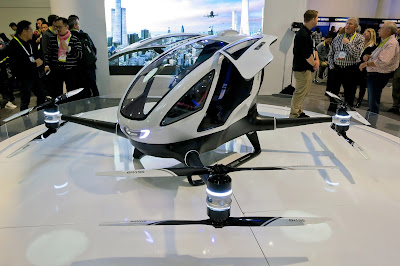Fly from A to B
Dubai announces passenger drone plans
A drone that can carry people will begin "regular operations" in Dubai from July, the head of the city's Roads and Transportation Agency has announced at the World Government Summit.The Chinese model eHang 184 has already had test flights, said Matt al-Tayer.
The drone can carry one passenger weighing up to 100 kg (220 pounds) and has a 30 minute flight time.
The passenger uses a touch screen to select a destination. There are no other controls inside the craft.
It is "auto-piloted" by a command centre, according to a video released by the government agency.
It has reported speeds of up to 100 miles per hour (160 kilometres per hour) and can fly 31 miles (50km) on a single battery charge.
"This is not only a model," Mr al-Tayer, according to a report by the Associated Press.
"We have actually experimented with this vehicle flying in Dubai's skies."
The device was also approved for testing in Nevada in June 2016.
'Resilient to failure'
Dr Steve Wright, senior lecturer in avionics and aircraft systems at the University of the West of England, told the BBC that safety would have to be paramount.
"The way these systems work, making them work normally is easy.
The tricky bit is making systems that are resilient to failure," he said.
"I would like to see the drone flying for at least 1000 hours before I saw a human in it."
Dr Wright added that he would not be volunteering for an early flight.
"I'd have to be taken on board kicking and screaming."
Last month Israeli firm Urban Aeronautics announced that its Cormorant passenger drone - designed for military use - could be in use by 2020.
The $14m (£11m) drone can carry 500kg (1,100lb) at 185km/h (115mph).
Click on the link at the end of the text to see the video of the flying taxis.

Comments
Hi Graham, it’s more and more frequent to see this kind of news related to technologic advances and its impact on the everyday life. I would add something that I think it’s relevant: the new role of little countries (like Dubai or Israel) in this progress. Before, three or four decades ago, the technologic world was controlled only by United State, European countries or Japan. Today, the situation has changed, although the countries cited keep been the most important in this area.
But, is it really important this kind of advances? Sometime the press pay attention to news that isn’t as relevant as it’s seem. In my opinion, one news about the transport of one person in a drone can be consider curious, but nothing more. I don’t see the transcendence of the commentary. However, I understand that it’s interesting as something different in the boring everyday world.
In any case, as we can see, it’s very probably that fly without pilot or drive without driver will be rather normal in the next future. I don’t know if I will have courage for take a car or a plane like those. It will be a very important change in our lives, of course, but they are really surer? On the other hand, what will become of the jobs of pilots or drivers? We are going to a world without workers (or increasingly less workers). Will be able the states really bear this new situation?
José Luis proffesor
Over the last year or two, I have read about the different uses of drones in the papers. What surprises me most is the fact that anyone can buy one. I would have thought there would be tighter regulations.
It’s more and more frequent to see this kind of news related to technologic advances and its impact on everyday life. I would add something that I think is relevant: the new role of little countries (like Dubai or Israel) in this progress. Before, three or four decades ago, the technologic world was controlled only by the United States, European countries or Japan. Today, the situation has changed, although the countries cited are still the most important in this area.
But, are these kinds of advances really important? Sometimes the press pays attention to news that isn’t as relevant as it seems. In my opinion, some news about the transport of one person in a drone can be considered curious, but nothing more. I don’t see the transcendence of the commentary. However, I understand that it’s interesting as something different in the boring, everyday world.
In any case, as we can see, it’s very likely that flying without a pilot or driving without a driver will be quite normal in the near future. I don’t know if I will have the courage to take a car or a plane like those. It will be a very important change in our lives, of course, but are they really safer? On the other hand, what will become of the jobs of pilots or drivers? We are going to a world without workers (or increasingly fewer workers). Will states really be able to bear this new situation?